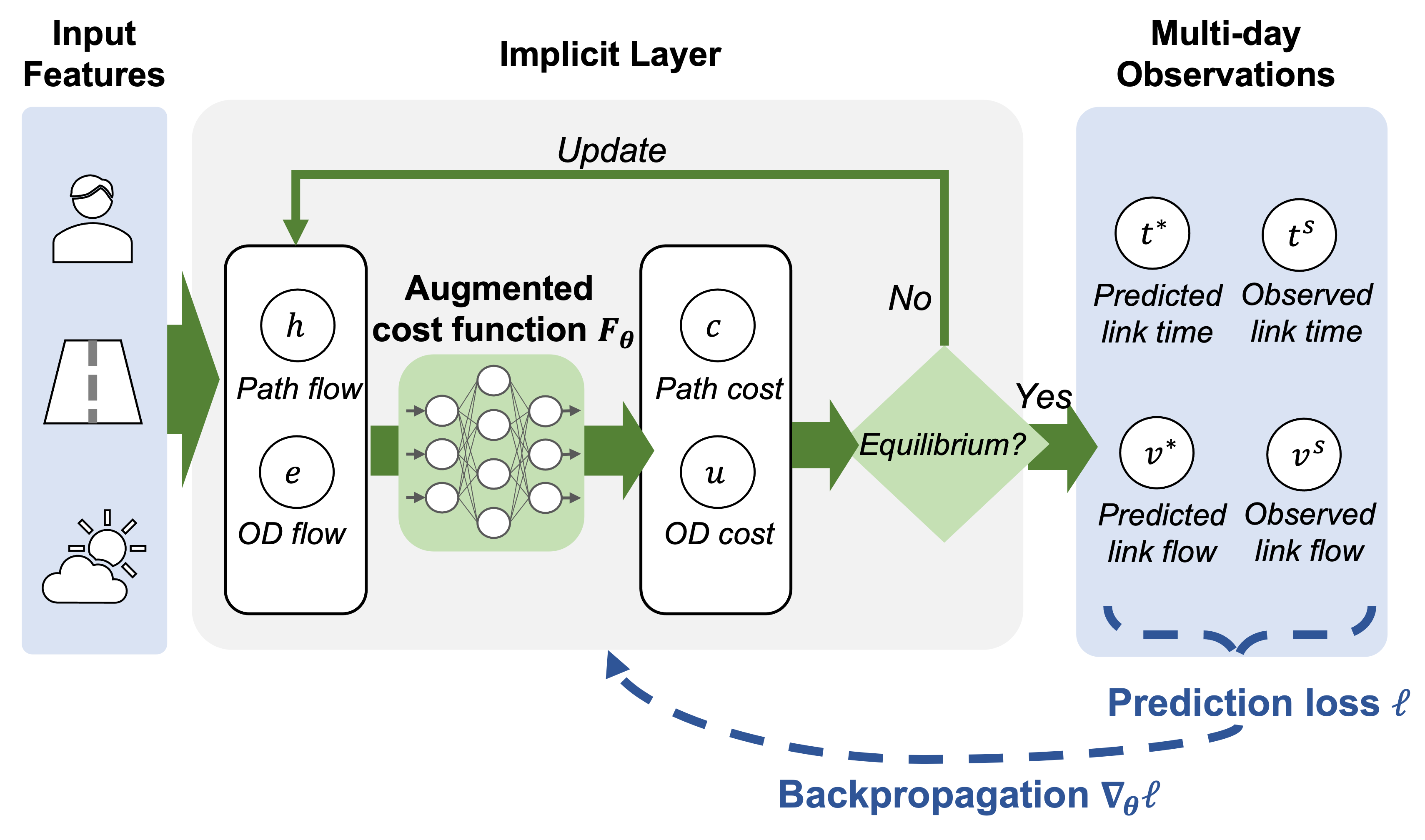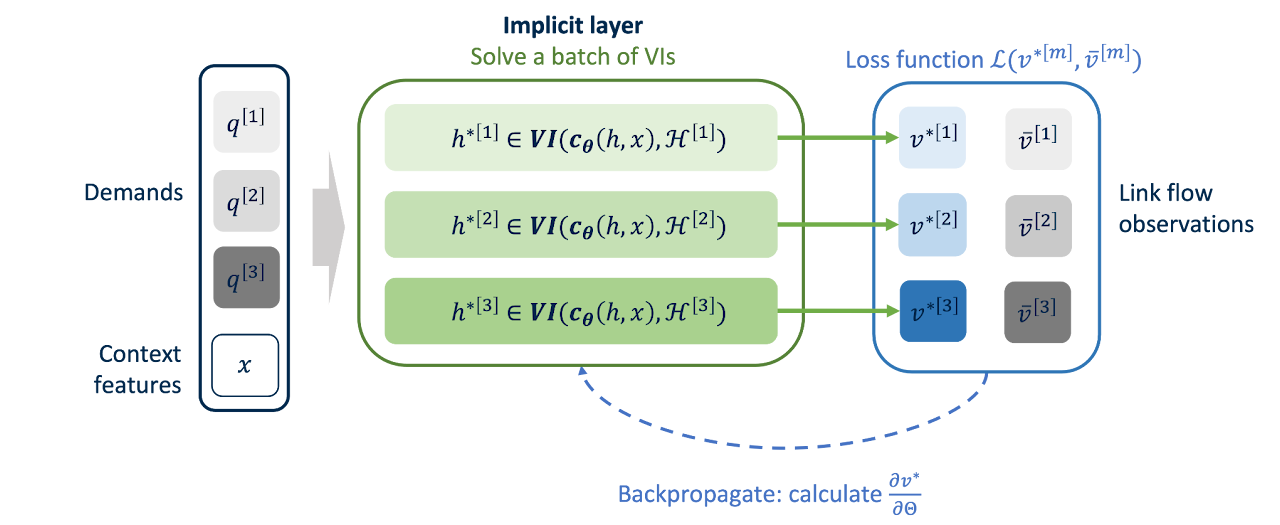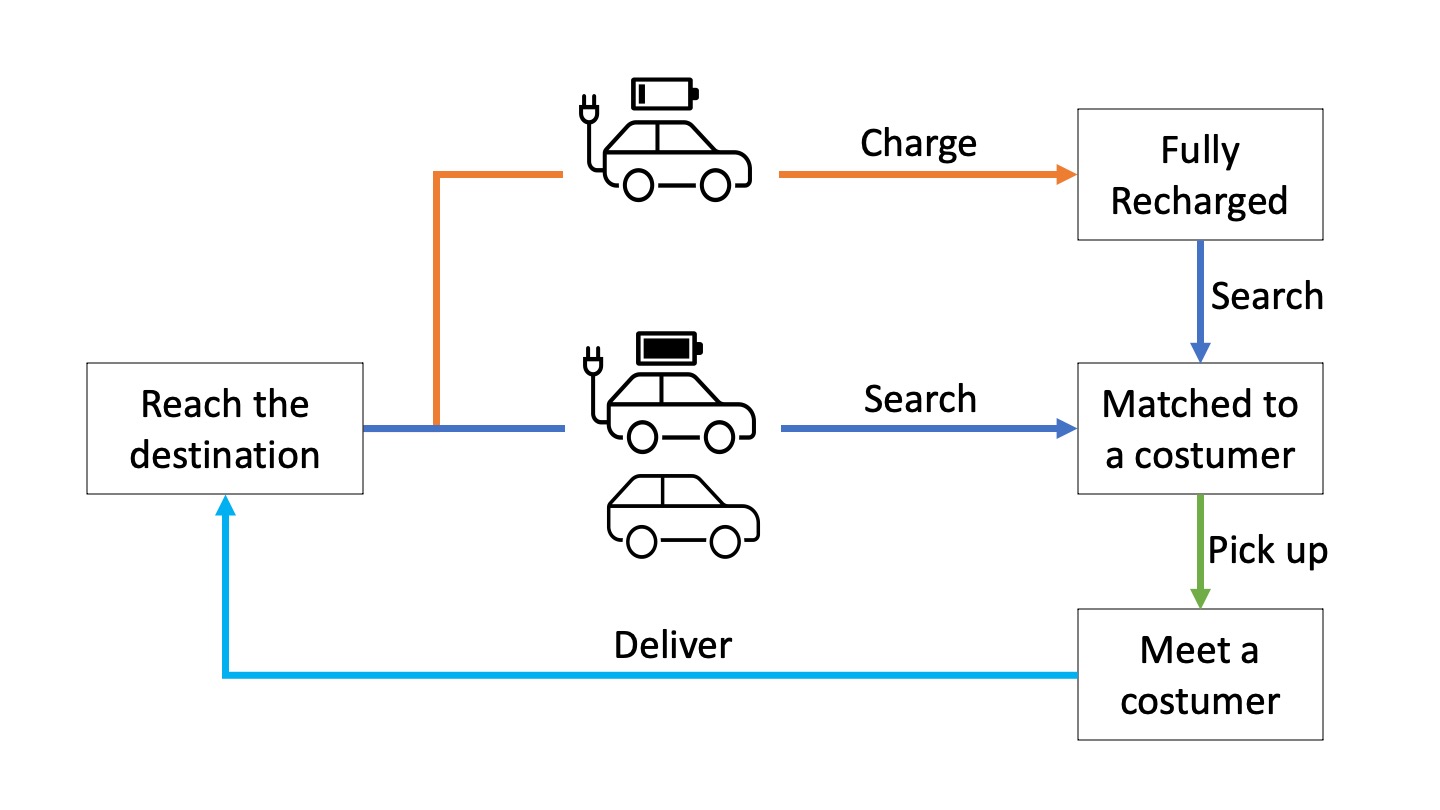SBU AI Mobility Lab brings together human-centered AI, game theory, and data-driven optimization to develop next-generation modeling and computational tools for mobility and logistics systems, with a focus on connectivity, electrification, and automation. See Research for details.
📢 We are recruiting 2-3 fully funded PhD students beginning Spring/Fall 2026, as well as motivated MS and BS students. See Opening for details.
🔥 News
-
2025.07.26: 🎉 Excited to share that our latest paper, End-to-End Learning of User Equilibrium: Expressivity, Generalization, and Optimization, co-authored with Dr. Yafeng Yin, is now published in Transportation Science!
-
2025.06.06: 🎉 Our poster, End-to-End Learning and Intervention of Transportation Network Equilibrium, won 1st place at the Conference on Foundation Models and AI Agents for Science. It was incredibly meaningful to see our work appreciated by experts beyond our core field.
-
2025.03.11: 🎖️ Dr. Zhichen Liu was honored as the sole global recipient of the prestigious 2025 Helene M. Overly Memorial Scholarship ($10,000) from the WTS International Foundation.
🔬 Research
SBU AI Mobility lab focuses on innovating next-generation modeling and computational tools for mobility and logistics systems, with a emphasis on connectivity, electrification, and automation. Our core research directions include, but are not limited to:
1. AI-Enabled Modeling and Optimization of Transportation Networks
By 2035, nearly half of all new vehicles in the United States will be connected, generating unprecedented volumes of mobility data. We are developing an AI-enabled inverse learning framework that leverages advances in machine learning and corwdsourced mobility data to transform the foundational paradigm of transportation network equilibrium modeling — a pillar of transportation system planning and management for over seventy years.
2. Economic Modeling and Regulation in Multimodal Transportation and the Sharing Economy
Ridesourcing vehicles generate nearly three times the vehicle miles traveled compared to private vehicles and are destined to be the next special fleet for electrification. However, high purchase costs and limited access to fast charging remain major barriers. This direction develop a novel aggregate equilibrium model for the electrified ridesourcing system and design innovative (i) regulatory policies and (ii) differential matching mechanisms to accelerate the electrification.
3. Learning, Adaptation, and Policy Design in Human–Autonomous Vehicle Interactions
By 2045, half of all new vehicles sold in the U.S. are expected to be autonomous. As humans and AVs increasingly share the road, complex interaction dynamics will emerge. While some believe AVs will enhance safety, others raise concerns that AVs’ strict adherence to traffic laws may provoke aggressive behaviors — for instance, pedestrians intentionally running red lights — potentially destabilizing traffic flow. This research seeks to model and inform the co-adaptation of humans and autonomous systems. Our goal is to support policymakers in designing behavioral and regulatory strategies that improve safety, reduce congestion and emissions, and facilitate broader AV adoption.
📖 Publications
🌟 Featured Papers

End-to-End Learning of User Equilibrium: Expressivity, Generalization, and Optimization
Zhichen Liu, Yafeng Yin, Transportation science, 2025

End-to-end learning of user equilibrium with implicit neural networks
Zhichen Liu, Yafeng Yin, Fan Bai, Donald K Grimm, Transportation Research Part C: Emerging Technologies, 2023

Regulatory policies to electrify ridesourcing systems
Zhichen Liu, Zhibin Chen, Yafeng Yin, Zhengtian Xu, Transportation Research Part C: Emerging Technologies, 2022
🌟 Other Papers
- Dynamic origin-destination flow prediction using spatial-temporal graph convolution network with mobile phone data, Zhichen Liu, Zhiyuan Liu, Xiao Fu, IEEE Intelligent Transportation Systems Magazine, 2021.
- Estimating Sectional Volume of Travelers Based on Mobile Phone Data, Zhichen Liu, Xiao Fu, Yang Liu, Weiping Tong, Zhiyuan Liu Journal of Transportation Engineering, Part A: Systems, 2020.
🌟 Research in Progress
- Large-Scale Inverse Learning of User Equilibrium via Multiconvex Optimization. Zhichen Liu, Yafeng Yin and Xi Lin. Under second-round review with the 26th International Symposium on Transportation and Traffic Theory.
- Distributionally Robust Transportation Networks Design with Contextual Uncertainty. Zhichen Liu, Yafeng Yin, and Xi Lin. Preprint accepted at the 2025 TRB Annual Meeting.
- Electrify Ridesourcing System with Differential Matching. Preprint accepted at CASPT2025.
- Learning Perturbed Utility Route Choice from Trajectories. Ben Rosenblad, Peisen Li, Yafeng Yin, and Zhichen Liu. Submitted to the 2026 TRB Annual Meeting.
👩🔬 Team
🌟 Principal Investigator
Dr. Zhichen Liu received her Ph.D. in Civil Engineering from the University of Michigan, where she was advised by Prof. Yafeng Yin. She also earned a dual Master’s degree in Industrial and Operations Engineering from the University of Michigan.
Dr. Liu has published as first author in leading journals including Transportation Science, and previously served as a Visiting Scientist at General Motors. Dr. Liu is a recipient of the Rackham Predoctoral Fellowship and was honored as the sole global awardee of the prestigious Helene M. Overly Memorial Scholarship (2025) by the WTS International Foundation for her contributions to research and community service. She also serves as a reviewer for Transportation Science, Transportation Research Part B/C/E, IEEE Transactions on Intelligent Transportation Systems, IEEE Transactions on Control Systems Technology, Transportation Research Record, and other leading journals in the field.
Professional Experience
- Assistant Professor (Tenure-Track), Department of Civil Engineering, Stony Brook University (September 2025 - present)
- Visiting Scientist, General Motors, Warren, MI (July–November 2023)
- Research Assistant, NYU Shanghai, Civil Engineering (August 2020 – May 2021)
🌟 Current Members
We are currently recruiting Ph.D. students and host project-based students at all levels. Profiles will be added as the group grows. See Opening for details.
🚀 Opening
Stony Brook University is a flagship R1 institution in the State University of New York (SUNY) system, located near New York City. It is home to a distinguished faculty that includes four Nobel Prize winners. We are building a collaborative and interdisciplinary research lab and are actively looking for motivated students to join us.
🌟 2-3 Ph.D. Students for Spring or Fall 2026, 4–5 years of funding (includes a very competitive stipend and full tuition waiver)
Qualifications
- Hold or pursue a Bachelor’s or Master’s degree in Civil Engineering, Industrial Engineering, Electrical and Computer Engineering, Applied Mathematics, Statistics, or a related field.
- Proficiency in programming and computational tools is preferred.
- Strong background and interest in operations research (convex/nonconvex/stochastic optimization), machine learning (deep/reinforcement learning), game theory, or mechanism design is preferred.
Please follw the steps below when applying:
-
If you are interested, please send an email to Zhichen.Liu@stonybrook.edu with the subject line “Prospective Student - YOURNAME” including your CV and transcript.
-
If you appear to be a potential fit, I will reach out to schedule a 30-minute screening interview. This will be an informal conversation for us to get to know each other and discuss your interests and goals.
Please Note:
-
For students who have reached out, I carefully read every application and truly appreciate the time and effort you put into preparing your materials. Due to the large number of applications, only shortlisted candidates will be contacted for the next steps. I apologize for not being able to reply to everyone individually.
-
Admission is on a rolling basis. If this information is still posted here, the application is still open.
-
Next Priority Date: October 1, 2025 for Spring 2026. You can check CEE Application Information.
-
Our department has openings for the GAANN fellowship program. The prospective student can choose any Civil Engineering faculty member to be their academic advisor. Contact me if you are interested and eligible to apply.
🌟 M.S. Students
While my lab currently does not offer funded positions for M.S. students, I welcome those interested in completing their M.S. projects under my supervision. If you’re seeking a project advisor, feel free to reach out to discuss potential research topics.
🌟 Undergraduate / High School Students
We host in-person undergraduate and high school students as well as Remote research interns interested in pursuing a Ph.D. Feel free to contact me to discuss potential research projects suited to your background and interests.
🤝 Connect With Us
Whether you’re an industry partner, researcher, or student, we’d love to hear from you. We’re always open to new ideas, collaborations, and conversations about shaping the future of next-generation mobility system.
💡 Research & Proposals
We welcome opportunities to co-develop research projects and grant proposals that connect academic insights with real-world impact.
🎤 Talks & Workshops
We offer tailored presentations, workshops, and guest lectures for academic, civic, and industry audiences on next-generation mobility systems.
📬 Get in Touch
Feel free to reach out anytime:
- 📧 Email: zhichen.liu@stonybrook.edu